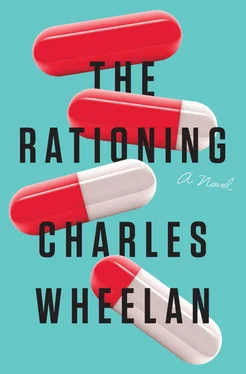“So one day my mom comes home and tells us she’s running for the school board. Truth be told, there were three open seats and only three candidates, so really she volunteered for the school board. But her name was on the ballot, and we all went together and voted for her, and then she was on the school board. Bless my mother, she was a kind soul, never one for direct confrontation, but don’t get me wrong, that woman could get her point across. So when my dad started grumbling about some injustice or another, she would say, ‘Can you read that to me when I get back, honey, because I’ve got a meeting to get to.’ My sisters and I would look at each other and smile, because we knew what she was really saying was, ‘If you’re so upset about the situation, why don’t you get your big fat black ass out of that chair and do something?’”
The Strategist smiled, as did others around the table. The Acting Secretary continued, “Something changed after my mom joined the school board. She served for fourteen years and she made a lot of difference. We could see it. She’d say one night over dinner, ‘We need a better library,’ and then two or three years later, we’d be sitting at some ribbon-cutting for a new library. Don’t get me wrong, my dad still spent a lot of time in that chair. He died there. I mean he literally died in that chair . But he lived to see me get elected mayor, and he lived to see Barack Obama become president. I spent the better part of a day trying to get him a ticket to the inauguration, and we went together. When it was over, and we were still sitting in our seats, he turned to me and he said, ‘You need to keep doing what you’re doing.’
“Now, to be clear, he was right back in his chair the next week, yelling at the television. But that’s the phrase that stuck with me: ‘You need to keep doing what you’re doing.’” The Acting Secretary paused and looked around the table. “I’m sorry. I’ve gone on for too long.” He turned to the Strategist. “John, I am sorry about your brother. I really am. For what it’s worth, that’s exactly the kind of thing that would get my dad all riled up. It’s just plain wrong. But you know, and I know, that this is not the time to make that point.”
“I know,” the Strategist said. “Thank you.”
“And as bad as our situation is here, we got to keep doing what we’re doing,” the Acting Secretary added.
No one said anything. It was as if only the Acting Secretary and the Strategist had permission to speak. What could any of the rest of us add? The tenor of the room had changed for the better, though it would not necessarily last. In that moment, I felt part of something bigger. We would do our best to muddle through. We would join the ranks of other Americans who had muddled through. Maybe sensible people trying to muddle through is the best we can hope for , I thought. Muddling through won World War II. It got us through the Great Depression and the Trump presidency.
At the time, all this was just a feeling. I could not have articulated those thoughts in the Cabinet Room. Even now I struggle to put words against that fleeting sense of goodwill and purpose. The scientist in me says that the Acting Secretary’s inspiring speech caused a little burst of dopamine in my brain. But maybe that, too, is part of muddling through. Eventually the Chief of Staff said, “I think we all need a short break.”
I was growing more politically aware, noticing subtle cues and comments that had escaped me just a few days earlier. Our short break, which on the surface looked like any other group of adults lingering near coffee and pastries, was in fact more like a group of political animals gathering near a watering hole. The Majority Leader, with a Danish in each hand, was huddled in a corner with the Secretary of Defense. As I walked by, they were discussing some kind of defense appropriations bill. The Defense Secretary was making a passionate case for something, and the Majority Leader seemed to be agreeing with him.
The National Security Adviser stood alone on one side of the room, a solitary creature in this political tableau. Her work typically rose above this kind of political give-and-take, and she was too disciplined to eat pastries just because they happened to be there.
The Chief of Staff had made herself a cup of tea and was now using the break to answer as many calls and e-mails as possible. The mundane details of governing did not stop just because we were in crisis. She sat in a chair by the wall speaking on her phone with someone I assumed to be her assistant. “No, no, no,” I heard her declare emphatically. “Tell the Prime Minister if they announce more settlements, the President will veto the whole foreign aid bill. Period.” She listened for a brief time and then issued more instructions. “Fine. Add Chile to the itinerary and cancel the fundraiser. What else?” She listened again and then exclaimed, “You’ve got to be kidding me! That’s the only open appointment they had this month. Tell her if she can’t make it to the orthodontist, I’m taking her phone away all weekend.” I was struck by how similar the Chief of Staff’s tone was in dealing with the Israeli settlement-building and her teenage daughter skipping an orthodontist appointment. In both cases, I found her threats to be entirely credible.
If the pastry table was a political watering hole, the Speaker was the predator loitering on the periphery, looking for an opportunity to strike. A coffee break was not to be wasted on tea or phone calls; it was ten minutes to be used for political advantage. I watched her watching the room, like I was on some kind of political safari. Her gaze settled on the Acting HHS Secretary, who was talking to the Strategist. The Acting Secretary had his arm draped over the Strategist’s shoulder in a supportive way. I could hear snippets of what they were saying, something about the Vietnam War. From across the room, the Speaker watched intently, waiting for the right moment. It wouldn’t surprise me if her breathing slowed and her pupils dilated. After about a minute, the Acting HHS Secretary said, “Get something to eat, John.” The Strategist nodded and turned toward the pastry table. Almost immediately the Speaker walked briskly toward the Acting Secretary, who was now standing alone near the wall. The Acting Secretary took a step toward the coffee and pastries; the Speaker quickly inserted herself between him and the food table, making it appear that they came face-to-face by serendipity. In my mind, I could hear the narrator on the Discovery Channel explaining (with a cool South African accent), “The Speaker, an adept hunter, has injected herself between the Acting Secretary and the pastries, cutting him off from his fellow cabinet members and leaving him effectively pinned against the far wall of the room.”
The Speaker got right to the point. “We’re wasting our time here,” she said.
“How’s that, Madam Speaker?” the Acting HHS Secretary replied respectfully.
“This is a matter for Congress to decide,” she said in a tone that bordered on accusatory.
“You’ve made that point,” the Acting Secretary replied without emotion. “Would you like some coffee?” He took a step to move around her toward the table, but the Speaker moved quickly to block his path. He was a large man and she was a relatively small woman, so the effect was almost comical. Still, he was not going to get his coffee unless he physically moved her out of the way. “What do you want?” he asked, losing patience.
“Look, you’re new at this,” the Speaker said with transparent insincerity. “Maybe you’re a little over your head.” The Acting Secretary laughed loudly, drawing looks from elsewhere in the room. (There was not a lot of other laughter.) The Speaker leaned closer. “What’s so funny?” she challenged.
Читать дальше












